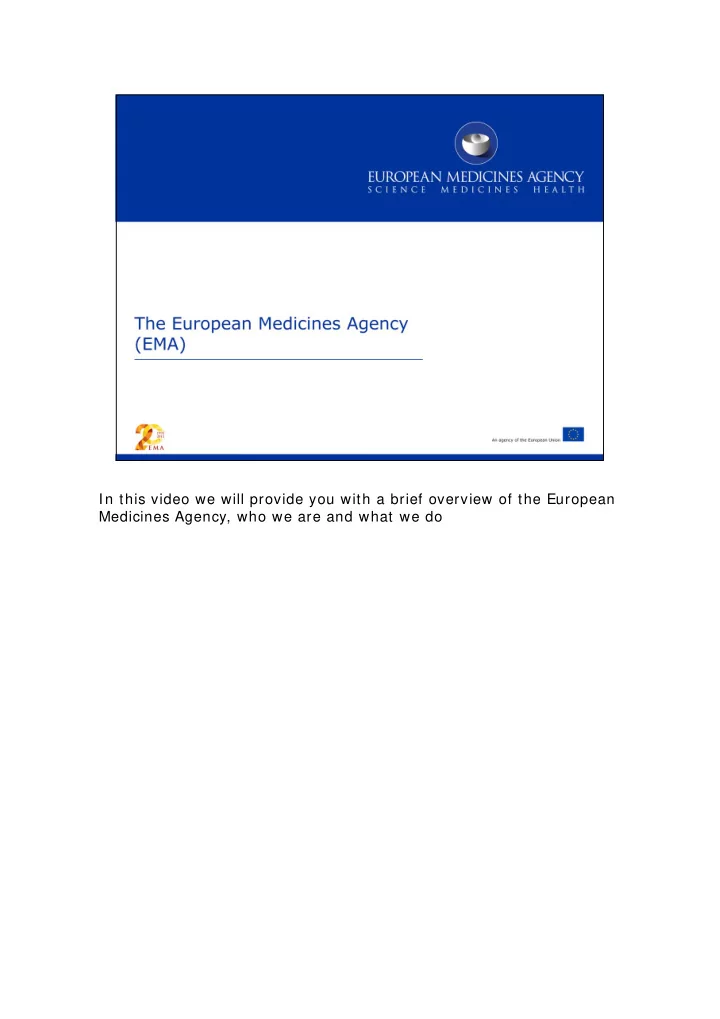

In this video we will provide you with a brief overview of the European Medicines Agency, who we are and what we do
The European Medicines Agency (or EMA) is the regulatory body in Europe that ensures that medicines are safe and that they work as expected. Located in London, the Agency is responsible for both human and veterinary medicines and has an important role in protecting public health in the EU.
Working together with the national authorities of the 28 EU Member States as well as Iceland, Norway and Lichtenstein, the Agency is a key part of the European regulatory system for medicines. This collaborative model is the basis of the Agency’s success as it gives the Agency access to a pool of experts (including regulators, academics, patients and healthcare professionals) from across the EU, giving it access to the best available scientific expertise
The EMA is an Agency of the EU, In addition to the MS and the 4,500 European experts we have available to us, we work closely with the European Commission and the European Parliament as well as a number of other EU Agencies. The Agency is governed by its Management Board composed of representatives of the MS, the Parliament and the Commission. The role of the Board is to adopt implementing rules and to set the strategic direction for the work of the Agency.
Our main responsibility is the protection and pro We also supervise the safety of medicines in the EU after they have been authorised. We can also give scientific opinions on medicines at the request of Member States or the European Commission.
It is important to know that there are some areas where the Agency isn't involved, in particular for pricing and reimbursement and access to medicines (which is negotiated by the member state in the context of their own national health system). In the same way, the EMA is not responsible for medical devices and cosmetics
Although most new medicines in Europe are approved through the centralised procedure, it is not the only way to get approval. There are two main ways of getting a marketing authorisation in Europe today, the centralised procedure (which you can learn more about by following the link to the video) and national procedures in the individual member states. 1.The other routes called mutual recognition and the decentralised procedure also provide way for companies to access markets in more than one member state and you can learn more about these by clicking on the links in the pdf of the slides on the EMA Patients Training page Additional inform ation: • EMA Basic video on ‘The Centralised Procedure at EMA’ for more information) • For more information on the MRP/ DCP procedures – http: / / www.hma.eu/ medicinesapprovalsystem.html
There are however some medicines that must be approved through the EMA, There are specific disease groups and types of medicines for which it is compulsory to come to the EMA and include medicines for rare diseases (also called orphan drugs) , HIV/ AIDS products and cancer drugs as well as biotechnology products and other innovative products. And the Agency has specific committees and working groups that specialise in evaluation of these products and disease areas.
There are 7 scientific committees that evaluate medicines at the EMA – 6 of these are for medicines for human use and one, the CVMP is for veterinary products. The Agency secretariat supports the work of these committees both in a scientific and logistical capacity. Four committees have members representing patients’ organisations and these provide important opportunities for patients to contribute their knowledge and experience in the disease area of interest.
There are many different types of experts who work with the Agency’s committees, - Patients and consumers - Healthcare professionals - Academics - And representatives of learned societies. We have a long history of working with patients and you can hear more about this in our video entitled ‘How the European Medicines Agency interacts with patients and consumers’.
In addition to evaluating medicines for human and veterinary use; and monitoring their safety We also facilitate the development of new medicines by giving scientific advice and providing guidance; Other areas of our work include the evaluation of applications for orphan designation, the evaluation of paediatric investigations plans, coordination of Member States’ inspections and the provision of good quality and independent information on the medicines to patients and healthcare professionals. This information to patients and healthcare professionals is reviewed by our members of eligible organisations of patients and healthcare professionals prior to being published.
If you want to find out more information about us, please look on our website www.ema.europa.eu And look in the About Us tab or in the Frequently asked Questions (FAQs).
Recommend
More recommend